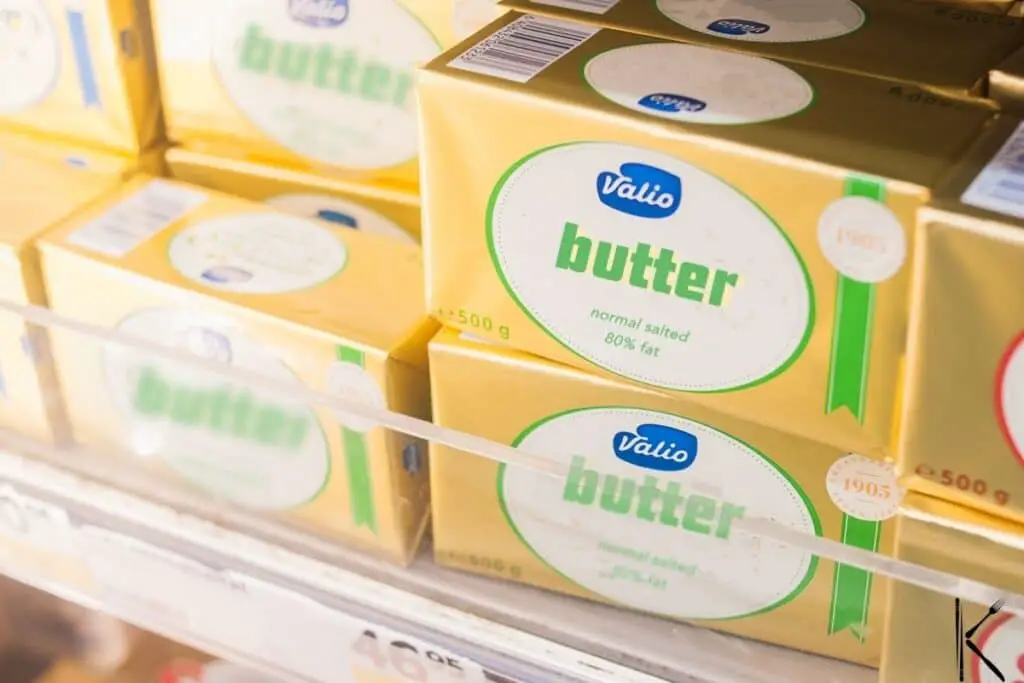Quick summary: Yes, butter can go bad over time, although it has a relatively long shelf life compared to other dairy products. Signs of spoilage include changes in color, texture, smell, or the presence of mold. Proper storage, such as keeping butter in the refrigerator and away from heat and sunlight, can help maintain its freshness and quality.
If you have been wondering how long your butter can last and whether it is suitable if you have left it on the counter a couple of times, we bring you all the things you should know.
Butter is one of those foods that a household can hardly do without. Whether you use it for cooking and baking or making cakes, perhaps you like to spread it on bread or toast every morning. In any case, butter is a widely used grocery.
Usually, it does not have such a long shelf life even when unpacked. About two or three months is some standard with manufacturers, although there are differences in brands. But hardly any butter will have a year’s shelf life because it is simply a perishable good. That doesn’t mean it spoils down easily within its good days, though.
How Long Does Butter Last?
Butter is a relatively healthy source of fat that the human body needs. As you might guess, it has very high-fat content. It also contains minimal water present. All this helps to defend itself against the usual bacteria because it does not represent a desirable place for their development. What will undoubtedly harm it is actually oxidation.
So how long is butter good for?
Duration of the butter in the refrigerator
Although it can stand at room temperature for a while, even a few days, keeping the butter in the fridge is definitely advisable. Whether closed or open, a cool place is certainly a desirable location for storage. If unopened, butter will probably be good for a whole month after its due date. After opening it will last several weeks.
And to immediately resolve the issues you probably have, it won’t hurt if you let it stand multiple times at room temperature to make it softer for delicious application on bread. But to be sure, you can separate only the part you intend to eat and leave the rest safe in the refrigerator. Cold temperatures will keep butter fresh and secure.
Duration of the butter in the freezer
You may not have even thought of it, but if by some chance you bought more packs of butter than you need, feel free to put a portion in the freezer. This will extend the shelf life by at least a few months, typically approximately six to seven.
When you want to use it, take it out of the freezer the day before and leave it in the fridge overnight to get to the ideal temperature. The taste, as well as the appearance, should not change much.
Is there a difference in storing salted butter?
The most common type is unsalted butter simply because it is more practical due to its neutral taste. However, many people prefer salted butter as their favorite spread on toast, so you can rightly ask if there is a difference in durability. In short, not much.
The probability is that salted butter will last a little longer than unsalted butter. Along with fat, there is also a more significant presence of salt, so it is certainly more resistant to spoilage. However, it will not be as substantial as you might think. Maybe it’s a matter of a few weeks or a month longer, but certainly not too long.
The same storage rules and signs of deterioration apply to salted butter.
Can Butter Go Bad?
Like any dairy product, butter can spoil. But unlike the others mentioned, it still lasts significantly longer, several months even. You won’t experience that with yogurt or cream. Since it is not very suitable for the development of bacteria, how do you know if the product is spoiled? We bring you a few sure indicators that you can trust.
Sign 1: It looks wrong
If there have been significant changes in appearance or mold stains have appeared, be sure to throw the product in the trash. Such spoiled butter can cause food poisoning.
Sign 2: It smells or tastes funky
Usually, butter has almost no odor or is very mild. If your product has a more robust, slightly acidic smell, it is probably not suitable for consumption. Also, if it tastes sour, throw it away immediately. Rancid butter has a pretty distinctive taste, and you’ll know if it happens.
Sign 3: It’s too dense
No matter how hard the cold butter usually seems to you when you want to spread it on bread, there is a clear difference if it is spoiled. Then it is strangely dense, and it seems odd to you. It’s a sure sign that its time has passed, and you’d rather refresh supplies.
You could also check these margarine shelf life tips if you run out of butter and need a replacement.
Which is the Best Way to Store Butter?
Although it is not rocket science, a few tips can help you maintain product freshness and quality. Here’s how to store butter properly.
Tip 1: Keep it away from the sun and heat
As you can guess, the sun and heat will badly affect the dairy products. It will melt entirely and begin to spoil. Always, therefore, choose fresh and dark places even when you take the product out of the fridge to use it.
Tip 2: Keep it in the refrigerator at all times
Always choose to store butter in the refrigerator. It will best preserve its quality throughout use. If you accidentally bought more packs than you need, put them in the freezer. Don’t leave butter on the counter overnight, although softened butter is not necessarily spoiled.
Tip 3: Always buy fresh stock
It is not out of place to add this advice at the end. Butter is simply a product that you want to buy fresh again when you run out. Don’t create stocks you don’t need because you’ll often throw money in the trash. Don’t worry. You can absolutely eat butter past its expiration date if everything seems normal. But keep it within reasonable boundaries.
Tip 4: Maintain the hygiene of the butter
When storing butter, pay attention to good hygiene manners and use a butter dish with a lid on it if you have it. Or keep it wrapped in original packaging. Use a clean knife when spreading because other food substances can speed up spoilage.
FAQs
How do you know if the butter has gone bad?
You can tell if butter has gone bad by checking for changes in color, texture, or the presence of an off or rancid smell. While butter can last for a while, any noticeable deviations from its usual characteristics might indicate spoilage.
Is it OK to use expired butter?
No, it’s not recommended to use expired butter, especially if it exhibits signs of spoilage like a rancid smell, off color, or unusual texture.
Can butter go bad at room temperature?
Most certainly, butter can go bad at room temperature. Although it can withstand an unusually long time at room temperature, in addition to becoming too soft, after a while, it will certainly spoil.
Does butter need to be refrigerated?
Yes, butter needs to be refrigerated all the time. However, you can take it out before use to soften it a bit. For more extended keeping, freezing butter is the way to go.
How long until butter spoils?
The time until butter spoils vary, lasting about 1 to 2 weeks at room temperature and several months when refrigerated.
Conclusion
Like all other milk products, butter can spoil as well. However, it takes surprisingly long to go off for a fresh dairy product, even up to a few months. The one enriched with salt will last even longer, while the version with other spices will probably be more perishable in a shorter time. Keep it in the fridge all the time, and don’t expose it to heat or the sun too much, and you will enjoy a great ingredient until you run out of it.
Up next:









